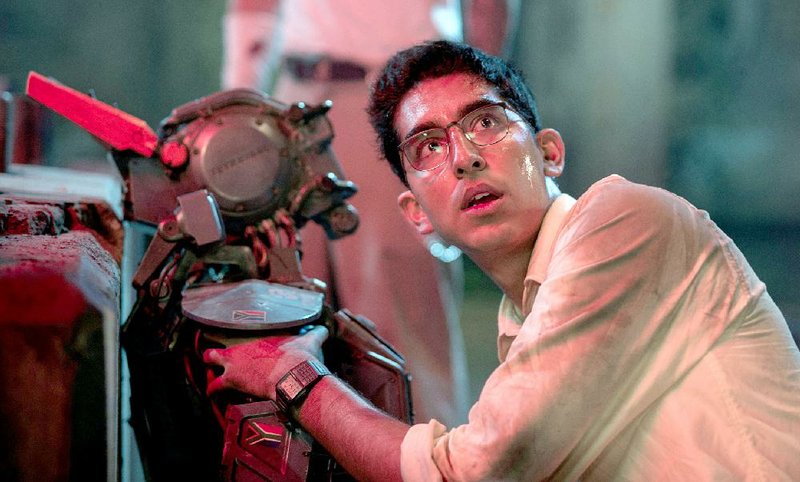South African Neill Blomkamp has proved to be an interesting director, one of the few who not only attempt to blend social commentary and action but have also been successful at it. (See 2009's District 9.) With Chappie, Blomkamp continues his brand of brainy violence, attempting to explore the nature of consciousness.
Deon Wilson (Dev Patel) has revolutionized the police force of Johannesburg with his Scout program, an army of robots programmed to carry out the law to its fullest extent, immune to corruption and incapable of nuance. While most are patting him on the back, he has attracted the ire of Vincent Moore (Hugh Jackman), a co-worker who has his own robot, the human-controlled MOOSE, a giant, inelegant, overly armed mecha, summarily rejected by the police and laughed off as being overkill.
Chappie
82 Cast: Sharlto Copley (motion capture performance), Dev Patel, Hugh Jackman, Yo-Landi Visser, Ninja, Sigourney Weaver
Director: Neill Blomkamp
Rating: R, for violence, language and brief nudity
Running time: 120 minutes
In his spare time, Deon has been working on something else: an artificial intelligence with intellect that can compose music and literature and is capable of ambition. After many unsuccessful attempts, he finally cracks the code and, one stolen decommissioned Scout later, he's on his way to test his creation.
He doesn't get far, however, as he's kidnapped by a pair of low-level gangsters, Ninja and Yo-Landi (played by South African rap-rave duo Die Antwoord as versions of themselves, names and all), who are in deep debt with their boss because of a botched job. They need to steal many millions of dollars within seven days or else they won't be around to see an eighth. The only problem is the pair won't be able to get anywhere with a caper while the Scouts are running around, and they assume Deon must have an off switch for the robots.
To their surprise, all he has is a half-busted robot and a program. Good enough for them; they can train it to be robot gangsta No. 1. Yo-Landi names this robot Chappie (Sharlto Copley), who comes into the world as a blank slate, terrified of everything around him. It's not quite what Ninja and Yo-Landi expected, but it's what they've got, and, with the help of Deon, they raise him. Ninja trains him in weapons and gangster-ry, while Deon exposes him to books, paintings, and the finer things in life.
Vincent catches wind of all this and reports it back to his boss (Sigourney Weaver), who orders him to decommission this rogue experiment at all costs.
Chappie isn't necessarily a bad movie, which is not to say it's good, either. It's well-crafted and entertaining enough, with good performances, impressive technology, and tight pacing, although there's an aggravating and bizarre tonal inconsistency that runs throughout.
On its face, Chappie is a serious movie. There are comedic sequences, some of which are genuinely funny, but there are other times where it's hard to tell if the film is in on the joke of how ridiculous, for instance, the final battle scene is, or if it's just the result of poor writing and execution.
The main reason Chappie doesn't work is that it doesn't make good use of its implicit themes. The film is positioned as an exploration of the nature of humanity, consciousness, and the blurring lines between man and machine. What Chappie winds up being is little more than an action movie.
There's no real discussion about what makes us human, and what little discussion there is is rudimentary and never lasts long. (Chappie, at one point, asks Deon what consciousness is. Deon tells him, more or less, it's what makes you you.) None of the characters, including Deon, are all that interested in what Chappie is -- in his fundamental nature. They take this remarkable technological achievement very well, as it turns out. Chappie and his nature are accepted as mundane fact, as though the fact that they're raising a robot is a normal occurrence.
Instead of anything interesting being done with this idea of a conscious artificial intelligence, the movie boils down to X wants Chappie to achieve Y. Ninja wants Chappie for the hijack; Yo-Landi wants Chappie to be her child; Vincent wants Chappie to be destroyed; Deon wants Chappie to be himself.
This isn't necessarily bad, but nothing in the film feels organic, as though elements of characterization and story are pieces of fabric slapped together with no effort taken to hide the staples holding them together. The characters are two-dimensional and strictly functional, serving obvious dramatic purposes.
The only character with any real depth is Chappie himself, although even he has his limits. Chappie is, for all intents and purposes, a kid, and, while at times it can feel a little trite, his victimization can border on heartbreaking. This is in no small part due to the remarkable subtlety and emotion Sharlto Copley is able to give him through movement and voice alone, with some undeniably impressive technology that brings him to life.
It's all very obvious and expected and, despite the almost painfully promising premise, feels mundane, which is unfortunate, as finding an action movie with such a brainy premise is rare. Blomkamp has proved that he can infuse depth and purpose into his violence, which makes Chappie feel like a missed opportunity, and, worse, generic.
MovieStyle on 03/06/2015

